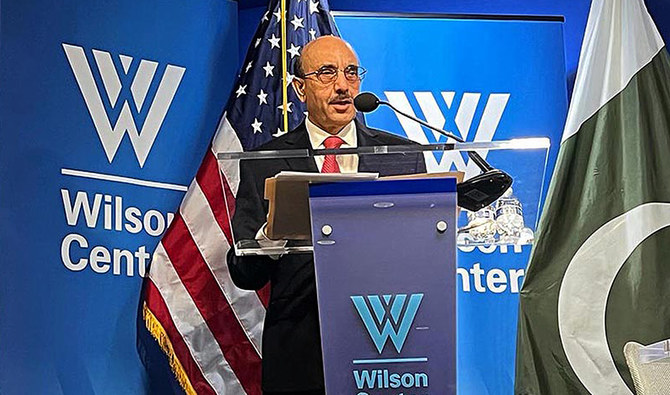ISLAMABAD: Pakistan’s Ambassador to the United States, Masood Khan, clarified this week that there is “no misunderstanding” between Washington and Islamabad over the latter’s decision to buy oil at cheaper rates from Russia.
Last week, Pakistan placed its first order for discounted Russian crude oil under a deal struck between Islamabad and Moscow in January this year. Pakistan’s desire to look for cheaper sources of energy has been fueled by its crippling economic crisis as its forex reserves dwindle and its national currency suffers massive devaluation.
Tensions between the US and Russia have skyrocketed ever since Moscow invaded Ukraine last year, with Washington supporting Ukraine financially and diplomatically to resist Russia’s military onslaught.
Since Pakistan has never bought oil from Russia before, there were concerns Islamabad’s decision would upset Washington, which has sought to cut off Russia’s oil profits in the wake of the Ukraine invasion.
However, the US government said that Pakistan was free to purchase oil from Russia at a discounted price even though it had not signed a Washington-backed price cap of $60 per barrel on Russian petroleum products. The price cap had been imposed to prevent Moscow from using oil revenue to finance its war against Ukraine.
“We have placed the first order for Russian oil, and this has been done in consultation with the United States government,” Khan said during a conference this week, organized by the Wilson Center’s South Asia Institute, a Washington-based think-tank.
“There is no misunderstanding between Washington and Islamabad on this count. [The US] suggested that [Pakistan] was free to buy below or up to the price cap and Pakistan abided by that agreement, so I think Washington is fine with that,” he said.
Islamabad’s energy imports during the last fiscal year were valued at $23.3 billion, constituting 29 percent of the country’s total imports. During the current fiscal year, Islamabad has already imported energy products worth $7.7 billion, according to the Pakistan Bureau of Statistics (PBS).
Prime Minister Shehbaz Sharif has increasingly called on his government to cut its reliance on fuel imports and turn toward solar energy, as the South Asian country actively tries to shore up its foreign reserves, pay off debt obligations, and avoid an acute balance of payments crisis.
















